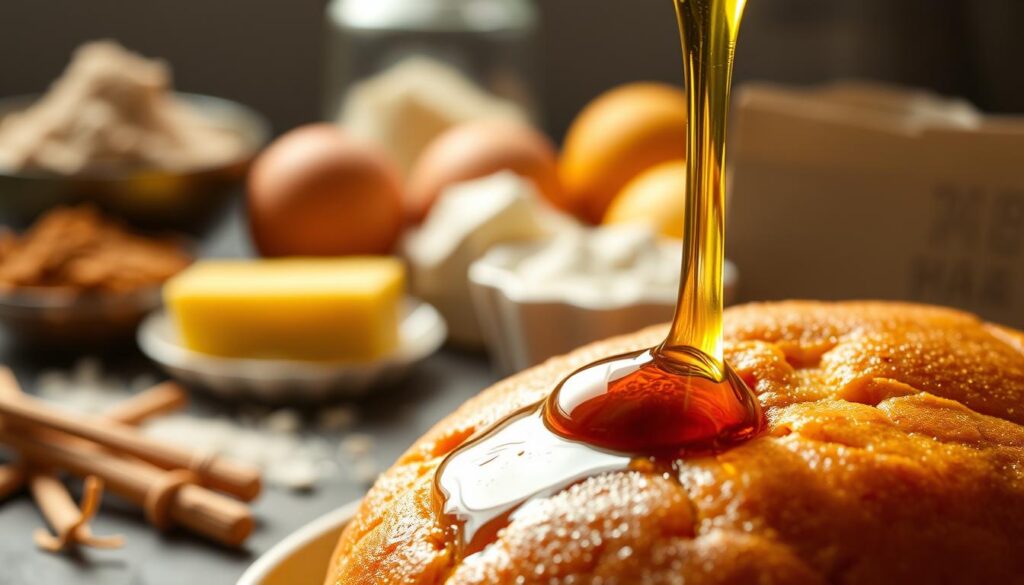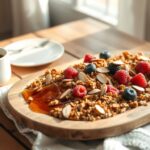Maple syrup makes baking special. It’s made from maple trees in North America. It adds more than sweetness to your baking.
It brings rich, complex flavors that sugar can’t match. Bakers and home cooks love using it. It’s different from regular sugar because of its depth and character.
Maple syrup’s flavor changes with the season and how it’s made. It’s not just for pancakes. It’s great in baking too.
It adds moisture and sweetness to baked goods. This makes desserts more complex and healthy. You can use it in cookies, bread, and more.
There are different maple syrup grades. Lighter ones are good for pastries. Darker ones are perfect for chocolate cakes and breads. It’s not just an ingredient; it’s a game-changer in the kitchen.
Maple syrup is great for both pros and hobbyists. It changes how you bake. Its natural taste and versatility make it a top choice for baking lovers.
Understanding Pure Maple Syrup: From Tree to Table
Maple syrup is a natural sweetener that makes baking special. It comes from maple trees and adds depth to recipes. This golden liquid is a treasure for bakers.
The journey of maple syrup starts in North America’s forests. Maple trees store sap in winter. Sugarmakers collect this sap with care and patience.
The Maple Syrup Grading System
Maple syrup has different grades for baking:
- Golden Color, Delicate Taste: Lightest grade, perfect for delicate pastries
- Amber Color, Rich Taste: Medium intensity, ideal for cookies and cakes
- Dark Color, Robust Taste: Strongest flavor, excellent for hearty baked goods
Different Types of Maple Syrup
| Maple Syrup Type | Flavor Profile | Baking Recommendations |
|---|---|---|
| Pure Vermont Maple Syrup | Rich, complex | Best for intense flavor desserts |
| Canadian Maple Syrup | Smooth, balanced | Versatile for multiple recipes |
| Organic Maple Syrup | Pure, natural | Ideal for health-conscious baking |
Harvesting and Production Process
Maple syrup production is precise. Sugarmakers tap trees in late winter. They boil the sap to make the syrup bakers adore. This method keeps the syrup’s quality and natural taste.
Knowing these details helps bakers pick the right maple syrup. This ensures their creations are always delicious.
Why Maple Syrup is a Superior Natural Sweetener
Maple syrup is a standout natural sweetener. It offers more than just sweetness. Using maple syrup in baking adds depth and nutrition, making recipes special.
Maple syrup is good for health-conscious bakers. It has minerals and antioxidants, unlike processed sugars. Adding maple syrup to your baking means you’re getting a nutrient-rich ingredient.
- Contains zinc and manganese
- Lower glycemic index compared to white sugar
- Rich in natural antioxidants
- Provides unique caramel-like flavor profile
Maple syrup is also sustainable. It’s made in ways that help forests. This method is kind to the environment and gives you a top-notch baking ingredient.
| Sweetener Type | Mineral Content | Flavor Complexity | Sustainability |
|---|---|---|---|
| White Sugar | Minimal | Neutral | Low |
| Maple Syrup | High | Complex | High |
Bakers love maple syrup for its versatility. It makes desserts rich and complex. Its natural sweetness is unmatched by refined sugars.
Maple Syrup Uses in Baking
Maple syrup baking recipes add a special touch to sweet treats. They bring natural sweetness and a deep flavor. Learning how to use maple syrup in baking can make desserts truly special.
Maple syrup does more than add sweetness. Its complex flavor makes baked goods unique. They stand out from recipes using regular sugar.
Substituting Sugar with Maple Syrup
Here’s how to swap sugar for maple syrup in baking:
- For every 1 cup of sugar, use 3/4 cup of maple syrup
- Reduce liquid ingredients by 2-4 tablespoons
- Lower oven temperature by 25 degrees Fahrenheit
Moisture Content Considerations
Maple syrup has a lot of moisture. This can change how your baked goods turn out. You need to adjust recipes to handle this extra liquid.
| Syrup Type | Moisture Impact | Recommended Adjustment |
|---|---|---|
| Light Maple Syrup | Minimal moisture | Reduce other liquids slightly |
| Dark Maple Syrup | Higher moisture content | Reduce liquids by 3-4 tablespoons |
Temperature Adjustments
Maple syrup caramelizes at a lower temperature than sugar. This means you need to watch your baking closely. It helps prevent burning and gets the best results.
- Watch baked goods more closely
- Use parchment paper to prevent excessive browning
- Consider using a lower rack in the oven
Learning these tips will help you make amazing maple syrup baked goods. They’ll show off the natural sweetness and rich flavor of this amazing ingredient.
Essential Tips for Baking with Maple Syrup
Mastering maple syrup in pastry baking is key. It’s about knowing its special qualities. Professional bakers say it adds depth and richness to desserts, making them truly special.
Here are some important tips for using maple syrup in baking:
- Choose the right maple syrup grade for your specific recipe
- Understand maple syrup’s moisture content and its impact on baking
- Adjust liquid and sugar ratios to achieve perfect consistency
- Experiment with different maple syrup flavors
Maple syrup dessert recipes need precision. Dark amber varieties are best for strong flavors. Lighter grades are better for delicate pastries. Also, reduce other liquids by about 1/4 cup for every cup of maple syrup to keep the right texture.
Temperature control is vital when baking with maple syrup. Lower the oven temperature a bit to avoid over-browning. Maple syrup caramelizes faster than sugar. Cutting the heat by 25 degrees Fahrenheit usually works best.
Using maple syrup with ingredients like vanilla, cinnamon, and nuts can make your desserts even better. These pairings create balanced flavors that highlight the syrup’s natural taste.
- Experiment with maple syrup in cookies
- Create unique glazes for cakes
- Develop innovative frosting techniques
- Explore savory-sweet maple applications
By mastering these techniques, bakers can turn maple syrup into a key ingredient. It adds depth and character to their creations.
How to Store and Preserve Maple Syrup for Baking
Keeping maple syrup fresh is key for great baking. It’s all about keeping the syrup’s flavor and quality. Knowing how to store it right makes sure your baked goods stay delicious.
When baking with maple syrup, how you store it matters a lot. The right storage can keep the syrup fresh and flavorful for longer.
Optimal Storage Techniques
- Store unopened maple syrup in a cool, dark place
- Refrigerate after opening to prevent spoilage
- Use airtight containers to prevent contamination
- Keep away from direct sunlight and heat sources
Shelf Life Guidelines
| Maple Syrup Type | Unopened Storage | Opened Storage |
|---|---|---|
| Pure Maple Syrup | 1 year in pantry | 6-12 months refrigerated |
| Commercial Maple Syrup | 2 years | 1 year refrigerated |
Identifying Spoilage
Look out for these signs that your maple syrup has spoiled:
- Mold growth on the surface
- Off-putting smell
- Unusual color changes
- Crystalization or fermentation
Professional bakers know the importance of proper storage for maple syrup. By following these tips, you’ll keep your maple syrup top-notch for all your baking.
Best Pastries to Make with Maple Syrup
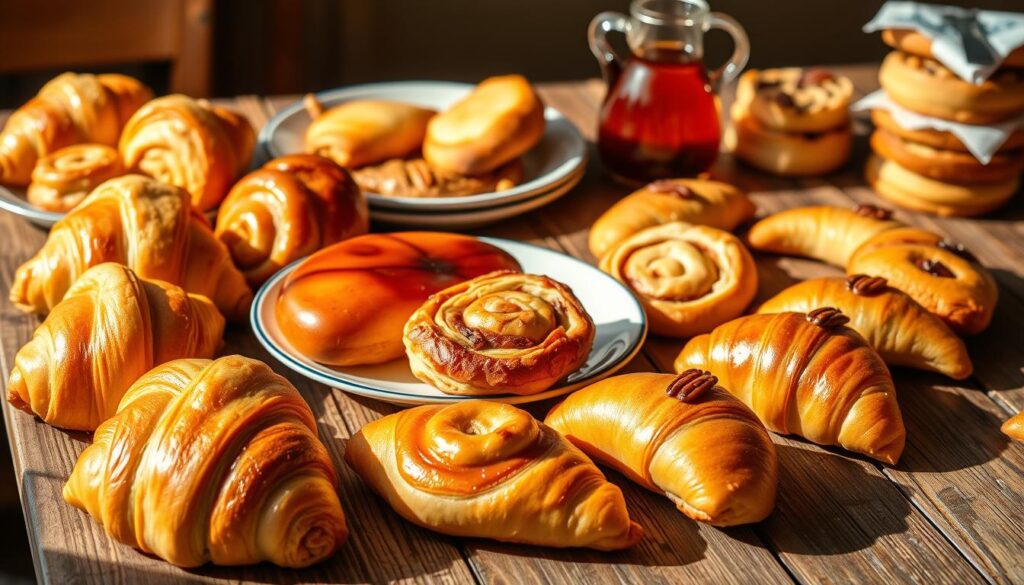
Maple syrup recipes for baking add a special touch to pastries. They make ordinary desserts into something truly special. This golden nectar brings a natural sweetness that’s hard to beat.
Passionate bakers find that maple syrup is magic in pastry making. The unique flavor of pure maple syrup adds depth and complexity. It’s something sugar can’t match.
- Maple Pecan Scones
- Maple Glazed Donuts
- Maple Cream Puffs
- Maple Apple Galette
Looking for baking ideas with maple syrup? Try these classic pastries. They show how versatile maple syrup can be:
| Pastry Type | Maple Syrup Application | Flavor Profile |
|---|---|---|
| Croissants | Maple Glaze | Rich, Buttery Sweet |
| Tarts | Maple Filling | Caramel-like Undertones |
| Danishes | Maple Drizzle | Warm, Comforting Taste |
Try different maple syrup grades to find the right sweetness for your pastries. Dark syrup has a stronger flavor. Lighter grades are sweeter but more subtle.
Maple Syrup in Bread and Muffin Recipes
Maple syrup makes bread and muffins special. It changes simple recipes into something amazing. Knowing how to use maple syrup in baking is key.
Maple syrup does more than add sweetness. It brings a deep, rich flavor. This makes simple recipes taste incredible.
Flavor Enhancement Techniques
Here are ways to boost maple flavor:
- Replace up to 1/2 cup of sugar with maple syrup in your recipe
- Use dark maple syrup for more intense flavor
- Pair maple syrup with complementary spices like cinnamon and nutmeg
“Maple syrup isn’t just a sweetener—it’s a flavor conductor that brings depth to baked goods.” – Professional Baker
Texture Modifications
Adding maple syrup needs some tweaks. Its liquid nature changes how bread and muffins turn out.
- Reduce liquid ingredients by 1/4 cup when adding maple syrup
- Lower oven temperature by 25 degrees to prevent over-browning
- Add an extra 1/4 teaspoon of baking soda to balance acidity
Pro tip: Start with small maple syrup quantities and experiment to find your perfect balance.
Creating Perfect Maple Syrup Glazes and Frostings
Making delicious maple syrup baking recipes takes any sweet treat to the next level. Maple syrup glazes and frostings add a deep, rich sweetness. This turns baked goods into gourmet treats.
To master maple syrup glazes, you need to know their special qualities. It’s all about finding the right balance between consistency and flavor. Experts say to start with pure, high-quality maple syrup for the best taste.
Essential Glaze Techniques
- Choose Grade A maple syrup for lighter glazes
- Adjust thickness by controlling liquid ratios
- Experiment with complementary flavors like vanilla or cinnamon
Temperature is key when making glazes. Warm maple syrup is perfect for drizzling over pastries. Cool syrup, on the other hand, thickens up for frosting cakes and cupcakes.
| Glaze Type | Consistency | Best Uses |
|---|---|---|
| Thin Drizzle | Liquid | Donuts, Pancakes |
| Medium Glaze | Smooth Flow | Cookies, Muffins |
| Thick Frosting | Spreadable | Cakes, Cupcakes |
Creative bakers can make maple glazes even better by adding unique ingredients. A bit of sea salt or a splash of bourbon can turn a simple glaze into a fancy topping. This makes any dessert even more special.
Pro tip: Always whisk maple syrup glazes thoroughly to prevent separation and ensure a smooth, glossy finish.
Seasonal Baking Ideas with Maple Syrup
Maple syrup makes baking special during fall and winter. Pastry chefs and home bakers use it in unique ways. They create desserts that feel like a warm hug.
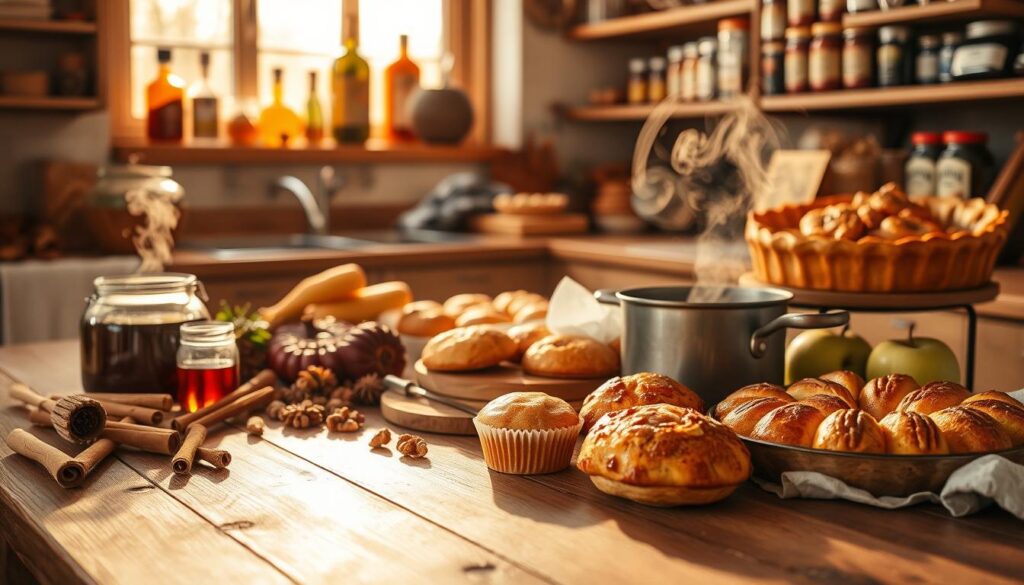
Maple syrup is very versatile in baking. It adds sweetness and flavor to treats. This makes it perfect for seasonal baking.
Fall Baking Inspirations
Fall is full of maple syrup baking ideas. Here are some tasty recipes:
- Pumpkin maple muffins with cinnamon crumble
- Apple maple galette with caramel drizzle
- Maple pecan scones
- Spiced maple layer cake
Winter Delightful Creations
Winter needs warm, rich desserts. Maple syrup adds depth to these treats. Try these recipes:
- Maple bourbon bread pudding
- Gingerbread maple cookies
- Maple cream cheese swirl brownies
- Maple walnut tart
Pro tip: Always use pure, high-quality maple syrup for the most authentic flavor in your seasonal baking adventures.
Common Mistakes to Avoid When Baking with Maple Syrup
Baking with maple syrup can be tricky for home bakers. It’s important to know the common mistakes to avoid. This ensures your baked goods turn out delicious.
When using maple syrup in baking, several mistakes can happen. Knowing these helps bakers make perfect treats every time.
- Incorrect Liquid Ratio: Maple syrup has more moisture than sugar. Reduce other liquids by 2-4 tablespoons for each cup of maple syrup.
- Temperature Sensitivity: Maple syrup caramelizes faster than sugar, which can lead to over-browning.
- Flavor Intensity: Different maple syrup grades greatly affect the taste of your recipes.
Baking with maple syrup needs careful measurement and technique. Professional bakers suggest using dark or robust maple syrup for stronger flavors in desserts like cookies and cakes.
Key mistakes to avoid include:
- Substituting maple syrup without adjusting the recipe’s chemistry.
- Using low-quality or artificial maple syrups.
- Neglecting to reduce the oven temperature by 25 degrees.
Pro tip: Always use pure, 100% maple syrup for the best baking results.
Maple syrup isn’t just a topping—it’s a sophisticated baking ingredient that demands respect and understanding.
Incorporating Maple Syrup in Vegan Baking
Vegan baking comes with its own set of challenges. But maple syrup is a game-changer. It adds flavor, moisture, and helps bind ingredients together. This makes it key for making tasty vegan treats.
Maple syrup is a great choice for vegan bakers. It replaces animal products in recipes. Its special mix of chemicals makes it a perfect substitute for other ingredients.
Egg Replacement Techniques
Finding egg substitutes in vegan baking can be hard. But maple syrup offers some clever solutions. Here are ways to use maple syrup in your baking:
- Use 1/4 cup maple syrup to replace one egg in most recipes
- Combine maple syrup with ground flaxseed for additional binding
- Adjust liquid ingredients to maintain proper moisture balance
Plant-Based Recipe Adaptations
Turning traditional recipes vegan needs creativity and knowledge of ingredients. Maple syrup is a natural sweetener and adds moisture. It’s essential for making plant-based baked goods.
“Maple syrup isn’t just a sweetener—it’s a game-changer in vegan baking.” – Professional Vegan Baker
To bake successfully with maple syrup, you need to know how to measure and mix ingredients. Try different amounts to get the right texture and taste in your vegan creations.
Maple Syrup and Flavor Pairing in Baking
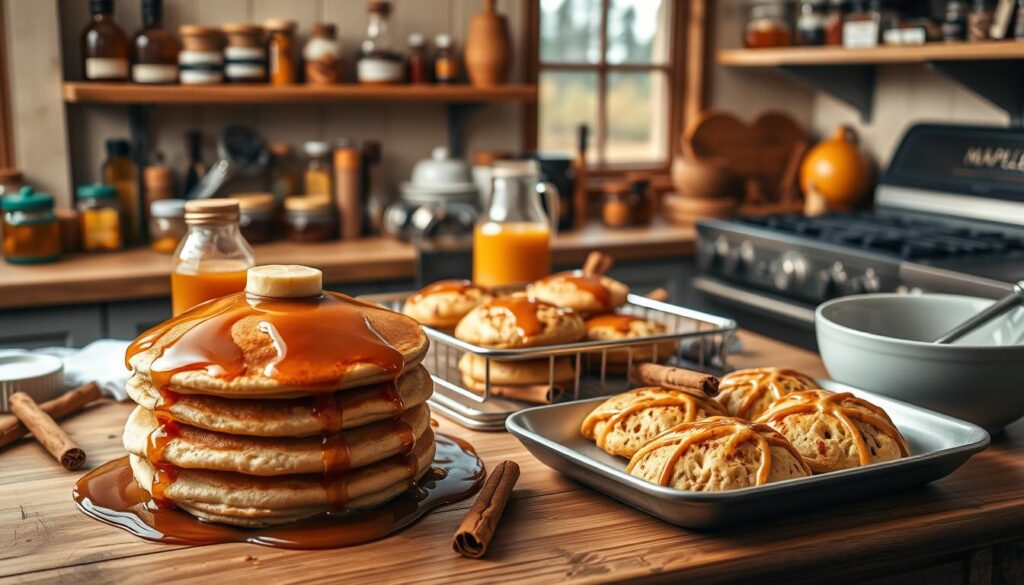
Exploring maple syrup in baking reveals a world of tasty combinations. Its rich flavor is perfect for making unforgettable treats. These treats will make your taste buds dance with joy.
Knowing how maple syrup tastes is key when baking with it. Its sweet, caramel-like flavor pairs well with many ingredients. This makes it a great base for delicious baked goods.
- Nuts: Pecans, walnuts, and almonds blend well with maple’s sweetness
- Fruits: Apples, pears, and berries add to maple’s complexity
- Spices: Cinnamon, nutmeg, and ginger bring out maple’s warm notes
Bakers can try exciting pairings to show off maple syrup’s versatility. The trick is to find the right balance. This lets each ingredient stand out.
| Ingredient | Maple Syrup Pairing | Recommended Baked Goods |
|---|---|---|
| Pecans | Excellent | Maple Pecan Scones |
| Cinnamon | Very Good | Maple Cinnamon Rolls |
| Apples | Outstanding | Maple Apple Cake |
Understanding these flavor combinations helps bakers make amazing desserts. These desserts will highlight maple syrup’s special taste and depth.
Health Benefits of Choosing Maple Syrup in Baking
Maple syrup baking recipes are not just tasty. They also offer health benefits. This natural sweetener is packed with nutrients, unlike refined sugars. Home bakers can enjoy great taste and health perks by using maple syrup in their recipes.
Maple syrup is a nutrient-rich choice for bakers. It’s not like empty-calorie sugar substitutes. This natural ingredient brings health benefits to your baked goods.
Nutritional Powerhouse
Maple syrup is a smart pick for health-conscious bakers. Here’s why:
- It has essential minerals like zinc and manganese
- It’s rich in calcium and potassium
- It also has trace amounts of vitamins B2, B5, and B6
Antioxidant Properties
Studies show maple syrup has amazing antioxidants. These compounds help fight off cellular damage. They also boost the body’s natural defenses.
| Nutrient | Amount per 1/4 Cup | Health Benefit |
|---|---|---|
| Zinc | 28% Daily Value | Supports immune function |
| Manganese | 165% Daily Value | Promotes bone health |
| Antioxidants | 24 Unique Compounds | Fights free radical damage |
Bakers can feel good about using maple syrup as a more nutritious sweetener in their favorite recipes. While it should be used in moderation, maple syrup is better than processed sugars.
Troubleshooting Common Issues in Maple Syrup Baking
Baking with maple syrup can be tricky for home bakers. Knowing common problems helps make delicious treats.
Controlling moisture is key in maple syrup baking. Maple syrup has more liquid than sugar. This can change how your baked goods turn out. You might need to adjust the amount of liquid in your recipe.
- Reduce liquid ingredients by 1/4 cup for every cup of maple syrup used
- Lower oven temperature by 25 degrees to prevent over-browning
- Use slightly less baking powder to manage rising
Flavor intensity is another challenge. Different maple syrup grades have different tastes. This can greatly affect your baked goods.
Experts suggest starting with lighter maple syrup grades for new recipes. Darker grades have stronger flavors but might be too much for some recipes.
- Grade A Golden Color offers mild sweetness
- Grade A Amber provides balanced maple taste
- Grade A Dark brings intense maple flavor
Texture can also be a problem. Maple syrup adds moisture, making baked goods denser. To fix this, bakers might add more leavening agents or less liquid.
Conclusion
Maple syrup adds a special touch to baking, beyond just sweetness. It makes simple recipes into amazing dishes, with unique tastes and health benefits. Discovering how to use maple syrup in baking opens up a world of tasty possibilities for everyone.
Using maple syrup in baking means knowing its special qualities. It can replace regular sugar, make glazes, and improve bread texture. Learning these skills lets bakers try new things with confidence.
Adding maple syrup to baking is more than just following steps. It’s about using a natural, rich ingredient with a long history. It’s perfect for making seasonal treats or new vegan desserts, leading to endless fun in the kitchen.
In short, maple syrup is where tradition, health, and creativity meet in baking. By grasping its uses, bakers can make unforgettable, tasty treats. These celebrate the unique qualities of this amazing natural sweetener.

